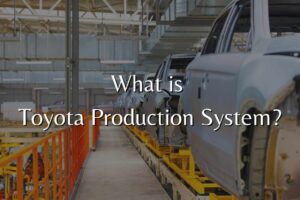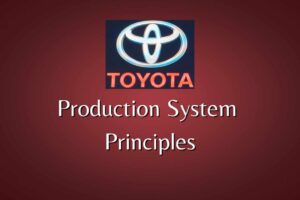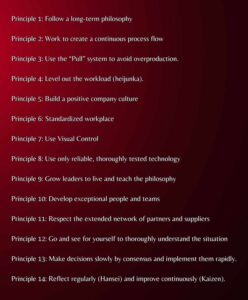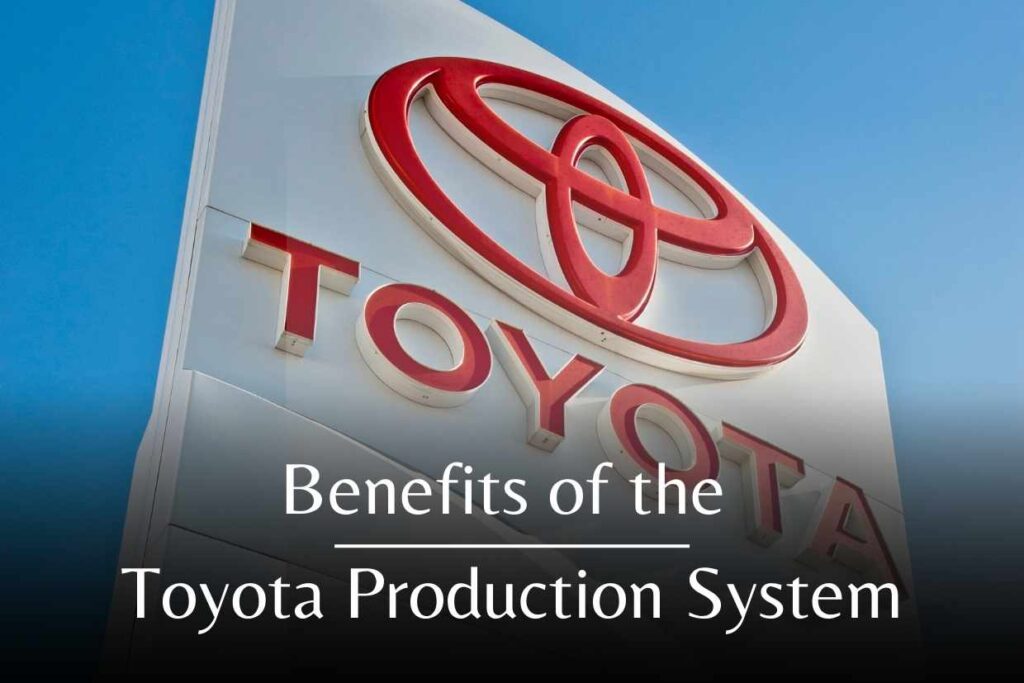You’ve probably heard of some of the many benefits of the Toyota Production System. However, before getting into that, you should know precisely what Toyota Production System is.
What is Toyota Production System?

Toyota Production System is a production system established to build efficiency in the shortest time to deliver customer needs. The whole production is systematized through the thought of complete elimination of waste and the thorough pursuit of the rationality of how to make it.
It is still a developing philosophy that enhances the competitiveness of a company.
Concepts of Toyota Production System.

The Toyota Production System is grounded on two main pillars, which sustain the basic philosophy of this system: cost reduction and conservation of resources through the elimination of waste.
Just in Time (JIT)
In simple words, it refers to the production of what you need, when it is required, as much as you need without stagnation so that it flows. It eliminates waste and enhances work efficiency.
Automation with the human touch
In simple words, it means to stop operations immediately if there is an abnormality or a problem and let the operators know about that issue.
Origin of Just in time
Kiichirou Toyoda, the founder of Toyota Motor Corporation, conceived Toyota’s just-in-time concept. He was the eldest son of Sakichi Toyoda, the founder of Toyota industries and the originator of the Toyota Group. Even though Toyota is one of the world’s leading vehicle companies in today’s world, after World War II, they were in a business crisis and had to carry out a significant restructuring. At that time, Japan was far less productive than the United States. Kiichirou Toyoda thoroughly researched the cause of the difference with the United States and the cause of the high cost. Then he discovered that just-in-time production was a way for Japan to survive.
Origin of Automation with a human touch
Sakichi Toyoda devised automation with the human touch. He was one of Japan’s leading inventors and who has sent out several inventions to the world. A typical example is the G-type automatic looming machine that stops automatically when the thread is broken. This invention was an epic make, one that eliminated the need for people to monitor thread breakage and led to a significant improvement in productivity.
The automation with human touch originated in this G type, the automatic looming machine. It is Mr Taiichi Ohno who embodied and systematized ideas of just-in-time and automation with the human touch. He became the vice president of Toyota Motor Corporation and gradually started to embroider these two ideas even though they were not completely understood at that time.
Now it is not only limited to Toyota Motor Company. All the other industries and suppliers around the world are also following these concepts.
Toyota Production System Principles.

There are 14 Toyota Production System principles, and they originate from Jeffery K. Liker’s book, “the Toyota Way,” and each of them is integral to the success of TPS. They help to improve your knowledge of Toyota’s Production System philosophy.

Benefits of the Toyota Production System.

The Toyota Production System benefits an organization and its people in numerous aspects.
Here are the top 16 benefits that you will be enjoying after following the Toyota Production System philosophy.
1. Helps to avoid short-term decision making
The first principle of the Toyota Production System is to follow a long-term philosophy when taking management decisions, even at the expense of short-term financial goals. This eventually helps the company to avoid short-term decisions that might negatively affect the organization as a whole.
2. Reduce wastage of time
One of the main focuses of the Toyota Production System is to provide customers with premium quality products in the shortest lead time and at the minimum cost while reducing waste in the company. Toyota’s Production System philosophy makes companies work to create a continuous process flow in work processes. That helps to reduce the waste of time in manufacturing products, unlike using traditional manufacturing operations that run batch production.
3. Avoid overproduction
In traditional manufacturing systems, machines run as fast as possible for as long as possible because they are operated to get the maximum output as much as possible. But when there’s no demand from the customers, those excessively manufactured products get wasted. Therefore, Toyota Production System uses a “Pull” system that only manufactures products in the quantity that meets customers’ demands at a particular time. Consequently, it avoids overproduction in manufacturing products in the company.
4. Reduce wastage of resources
Overproduction leads to a massive waste of all kinds of resources, including human, material, financial, and intangible resources. From employees’ skills, raw materials, tools, machines setup costs, and capital costs to intangible resources like patents, trademarks are also getting wasted in overproduction. But by applying Toyota Production System principles like using a “Pull” system to reduce the waste of these resources.
5. Eliminate unnecessary workload on people
Eliminating unnecessary workloads is essential to maintain a positive company culture within the company and enhancing productivity. “Heijunka” is a methodology that is used in the Toyota Production System to level out the workload of all the processes in a company. As a result, it creates an evenness and helps the company to grow further.
6. Helps to address problems quickly
One of the pillars of Toyota Production System philosophy is automation with a human touch. It refers to immediately stopping operations when there is an abnormality or a problem and making the operators aware of it. Companies that follow TPS possess machines that detect and flag abnormal conditions in manufacturing. It benefits the whole organization by allowing the process operators to address those abnormal conditions quickly.
7. Maintain regular outputs in the regular time
Toyota Production System uses stable methods in the manufacturing processes, and that helps to maintain the predictability of those manufacturing processes by producing regular outputs in regular time. It also benefits in maintaining the reputation of the organization.
8. Create a more organized workplace
Another benefit of this system is that it creates a more organized workplace. Companies that apply Toyota Production System have properly designed simple visual systems at the workplace to support the continuous flow system and the “Pull” system of the company. They make the workplace more organized as visual tools indicate special or abnormal procedures that occur in working and also warn employees about dangerous conditions in advance.
9. Helps to implement only tested and proven technologies
New technologies are unreliable and difficult to standardize most of the time. Therefore, companies that follow Toyota Production System conduct tests before adopting new technology in business processes, manufacturing systems, or products. Then they implement technologies that have been proven in trials and reject those that might disrupt the stability, reliability, and predictability of work processes.
10. Empower employees
Toyota Production system trains and empowers each employee and team to work within the corporate philosophy. They aim to achieve excellent results along with stabling a culture where the values and beliefs of the company are tagged along with time and people. The philosophy of the Toyota Production System also builds leaders who can live and pass on this philosophical approach to the upcoming new generations.
11. Help to improve continuously
Continuous improvement, or Kaizen, is a methodology created to figure out opportunities for streamlining work in addition to reducing waste. This encourages boosting the speed and quality of value delivery. With all the principles of the Toyota Production System, an organization eventually shows improvement in all aspects, including its efficiency, productivity, waste reduction, etc. Moreover, it helps to improve continuously by working on them throughout.
According to Toyota Production System principles, companies make decisions slowly by consensus and implement them rapidly. “Nemawashi” is the methodology applied to that principle. It is the process of discussing problems, figuring out potential solutions with those who will be affected, gathering opinions, and finally choosing a way out of it. This also helps the continuous improvement of the company.
12. Increase the productivity of the company
One of the main aims of the Toyota Production System is to provide the best quality products in the shortest lead time and at the lowest cost while thorough elimination of waste. Therefore, it increases the productivity of the company. Further, the organizations that implement Toyota Production System principles use cross-functional teams to improve quality and productivity
13. Enhance efficiency in manufacturing
The principle “Go and see for yourself to thoroughly understand the situation”, which is also known as “Genchi Genbutsu”, makes the company solve problems and improve processes by going to the source personally and observing to verify data than theorizing based on a superficial understanding of the situation. Therefore, it enhances the efficiency of the company.
“Hansei” is another principle followed by companies that follow Toyota Production System that helps enhance efficiency. It refers to reflecting on the work process regularly.
14. Increase competitiveness
Toyota production system is a production system that systematizes the way of thinking and improves a company’s competitiveness. When an organization uses and applies the philosophy of the Toyota Production System, it eventually challenges other companies. Therefore, it is beneficial for the company as it helps to grow and develop as a company. Plus, it also shows that you value them, and it increases competitiveness as well.
15. Increase respect for people
Toyota Production System is executed while respecting people, including customers, employees, and the team, at every part of a company’s value stream. Each employee is valued and respected, from top-level management to production-level employees. So, respect for people is increased with this philosophical approach.
16. Aligning everyone toward a common goal
In an organization, solely making money shouldn’t be the priority. Instead, Toyota Production System teaches to prioritize aligning everyone in the organization to work towards achieving common goals over simply money making.
Final note
Not everything happens in a snap of the fingers. It is not complicated, yet it takes a considerable amount of time, effort, and change to be undertaken to enjoy all of the benefits of the Toyota Production System. Even though we can preach TPS and talk about all its benefits, it will only work if you have the commitment and persistence to see it through. Toyota Production System requires complete buy-in from top-level management all the way down to the production floor as it is the responsibility of all the people in a company.
First and foremost, you need to have a good knowledge about the Toyota Production System before applying it in your company. Therefore, it is crucial to learn and understand the concept and principles of philosophy.



